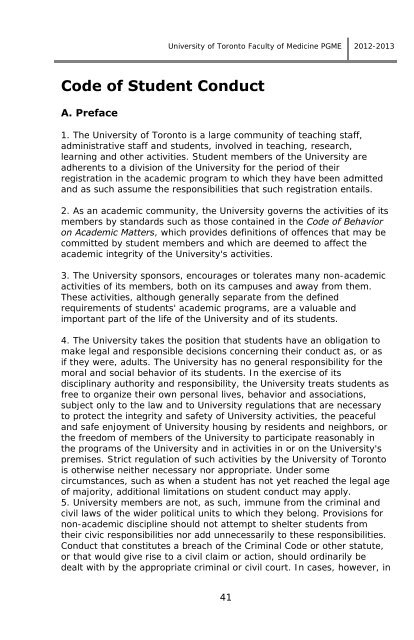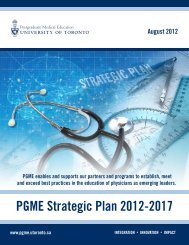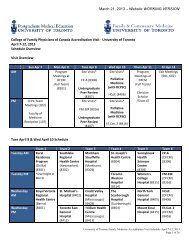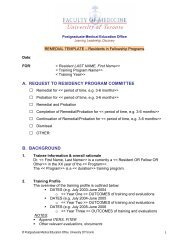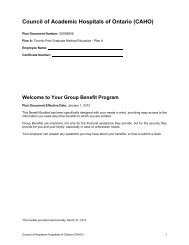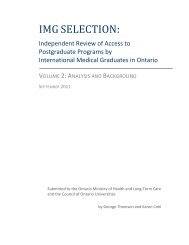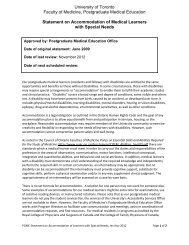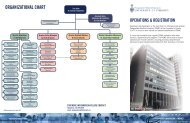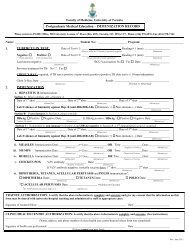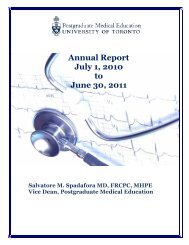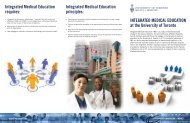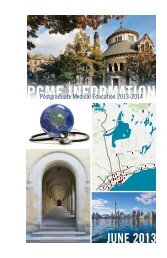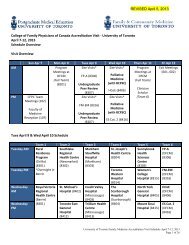Postgraduate Medical Education Information Booklet 2012-2013
Postgraduate Medical Education Information Booklet 2012-2013
Postgraduate Medical Education Information Booklet 2012-2013
Create successful ePaper yourself
Turn your PDF publications into a flip-book with our unique Google optimized e-Paper software.
University of Toronto Faculty of Medicine PGME <strong>2012</strong>-<strong>2013</strong><br />
Code of Student Conduct<br />
A. Preface<br />
1. The University of Toronto is a large community of teaching staff,<br />
administrative staff and students, involved in teaching, research,<br />
learning and other activities. Student members of the University are<br />
adherents to a division of the University for the period of their<br />
registration in the academic program to which they have been admitted<br />
and as such assume the responsibilities that such registration entails.<br />
2. As an academic community, the University governs the activities of its<br />
members by standards such as those contained in the Code of Behavior<br />
on Academic Matters, which provides definitions of offences that may be<br />
committed by student members and which are deemed to affect the<br />
academic integrity of the University's activities.<br />
3. The University sponsors, encourages or tolerates many non-academic<br />
activities of its members, both on its campuses and away from them.<br />
These activities, although generally separate from the defined<br />
requirements of students' academic programs, are a valuable and<br />
important part of the life of the University and of its students.<br />
4. The University takes the position that students have an obligation to<br />
make legal and responsible decisions concerning their conduct as, or as<br />
if they were, adults. The University has no general responsibility for the<br />
moral and social behavior of its students. In the exercise of its<br />
disciplinary authority and responsibility, the University treats students as<br />
free to organize their own personal lives, behavior and associations,<br />
subject only to the law and to University regulations that are necessary<br />
to protect the integrity and safety of University activities, the peaceful<br />
and safe enjoyment of University housing by residents and neighbors, or<br />
the freedom of members of the University to participate reasonably in<br />
the programs of the University and in activities in or on the University's<br />
premises. Strict regulation of such activities by the University of Toronto<br />
is otherwise neither necessary nor appropriate. Under some<br />
circumstances, such as when a student has not yet reached the legal age<br />
of majority, additional limitations on student conduct may apply.<br />
5. University members are not, as such, immune from the criminal and<br />
civil laws of the wider political units to which they belong. Provisions for<br />
non-academic discipline should not attempt to shelter students from<br />
their civic responsibilities nor add unnecessarily to these responsibilities.<br />
Conduct that constitutes a breach of the Criminal Code or other statute,<br />
or that would give rise to a civil claim or action, should ordinarily be<br />
dealt with by the appropriate criminal or civil court. In cases, however, in<br />
41


